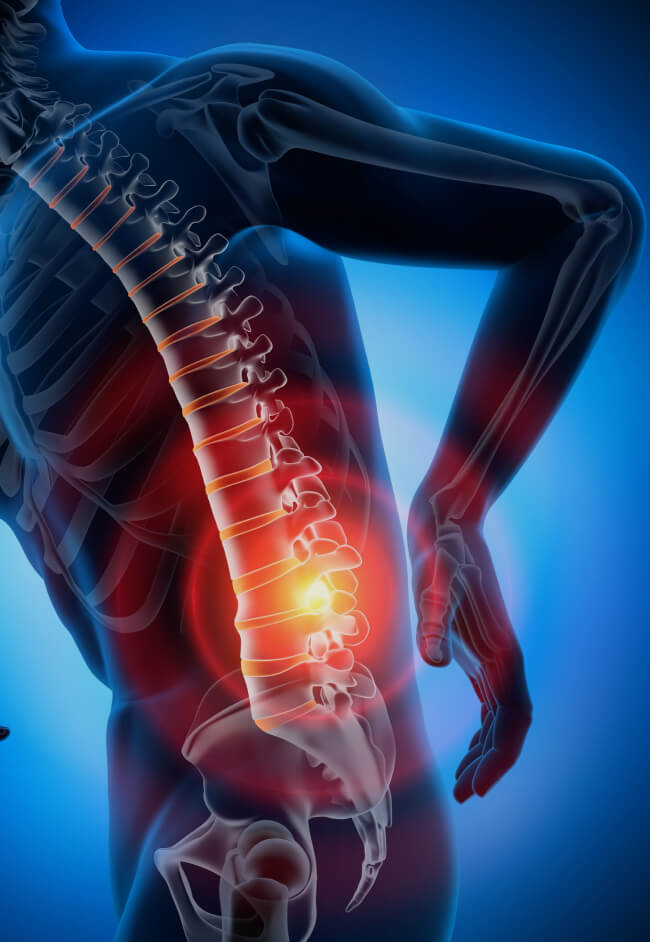Degenerative Disc Disease Specialist
Some loss of mobility and back pain are standard parts of aging. However, chronic pain could be a sign of degenerative disc disease (DDD). Millions of people are affected by this condition, and it can dramatically dampen one’s quality of life. However, working with a degenerative disc disease specialist can help you regain comfort and mobility. At the Global Brain and Spine Institute, Dr. Sarkiss provides expert diagnosis and treatment of DDD with both noninvasive and advanced surgical solutions.

Common Causes of Degenerative Disc Disease
Patients tend to develop DDD due to a combination of factors. When certain factors are present, the vertebral discs can lose elasticity and structural integrity. Most often, this happens gradually due to:
- Age-related disc dehydration
- Obesity and a sedentary lifestyle
- Genetic predisposition
- Spinal injuries or trauma
- Poor posture or improper lifting techniques
- Repetitive stress or overuse
- Smoking (which reduces disc nutrition)
Benefits of Treating Degenerative Disc Disease
Early treatment is integral to seeing better outcomes with noninvasive techniques. Later-stage DDD may require more invasive techniques but can still prove highly beneficial. Key benefits of treating DDD include:
- Avoiding long-term complications like nerve compression and spinal instability
- Relief from pain in your neck, back, arms, or legs
- Mobility improvements and more comfortable posture
- Reduced reliance on medications
- Better sleep and overall quality of life
- Slows or prevents further disc degeneration
Degenerative Disc Disease Treatment Options
Dr. Sarkiss builds treatment plans based on the severity of disc deterioration. We start with conservative options whenever possible, reserving surgery only for severe disc issues.
- Physical therapy and muscle strengthening
- Nonsteroidal anti-inflammatory drugs (NSAIDs)
- Epidural steroid injections
- Lifestyle modifications (e.g., weight loss, posture correction)
- Minimally invasive spine surgery
- Disc replacement or spinal fusion (for severe cases)
Degenerative Disc Disease FAQs
What results can I expect?
The goal in treating DDD is to improve symptoms with minimal intervention. Depending on your treatment, it can take a few weeks for notable improvements. Treatments can adapt with the patient. Dr. Sarkiss may make adjustments based on your individual results and situation.
With appropriate treatment, patients can expect:
- Improvements in movement
- Reduction in pain
- Better spine stability
What are the signs and symptoms of degenerative disc disease?
During the early stages of DDD, symptoms may be mild and intermittent. Over time, they can increase in severity and even become chronic. Signs to watch out for include:
- Persistent or intermittent back or neck pain
- Pain that worsens with sitting, bending, or twisting
- Radiating pain to the arms, shoulders, buttocks, or legs
- Numbness or tingling in the limbs
- Muscle weakness or stiffness
- Decreased flexibility or range of motion
Will I need surgery for degenerative disc disease?
Ideally, we can slow DDD through a means of conservative measures and lifestyle modifications. However, severe cases may only find relief with surgical intervention. With later-stage DDD, Dr. Sarkiss may recommend surgery to address symptoms and restore spinal function.
What types of surgery help with degenerative disc disease?
- Spinal Fusion: Surgically fuses two vertebrae to enhance stability and prevent painful movement.
- Artificial Disc Replacement: Dr. Sarkiss will replace a damaged disc with an artificial one.
- Laminectomy: Involves surgical removal of part of the vertebra to relieve pressure on nerves.
- Discectomy: Involves removing the damaged portion of the disc, reducing any pressing on the nerve.
Schedule a Consultation
Do not let degenerative disc disease control keep you from comfort and mobility. Schedule your consultation today with our degenerative disc disease specialist, Dr. Sarkiss, at the Global Brain and Spine Institute. He can help you understand your treatment options and start you on a path to a renewed quality of life. Contact us today to schedule an appointment and take the first step toward combating your condition.
